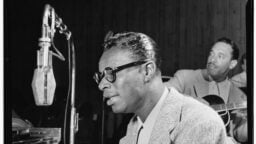Irving Azoff thinks too many people are under-paying artists and songwriters, and he ain’t taking it lying down.
Earlier this year, the legendary manager spearheaded a petition from 186 artists against YouTube‘s safe harbor protections in the US market – signed by everyone from Taylor Swift to Sir Paul McCartney, Lady Gaga, Beck and Gwen Stefani.
Now, he’s getting legal – but, for once, it’s not Google in his sights.
Azoff’s performing rights society startup, Global Music Rights, represents the catalogue of 71 songwriters, including works performed by John Lennon, Justin Bieber, Smokey Robinson, Steve Miller, Shakira and Drake.
“This is the most important fight of my professional life.”
Irving Azoff
It’s just filed suit against the Radio Music Licensing Committee (RMLC) in US federal court for antitrust violations.
RLMC represents 10,000 US radio stations. Azoff is up in arms that these broadcasters pay an average of 4% of their revenues to songwriters in the US. (They also don’t pay anything to artists and labels, but that’s a different debate.)
“This is the most important fight of my professional life,” Azoff said – and he’s had a fair few over the decades.
“I will not stop the fight for fairness to artists and songwriters.”
According to GMR’s complaint, RLMC’s US radio “cartel” controls more than 90% of radio industry revenue, while reaching more than 245 million listeners weekly.
Attorney Daniel Petrocelli of O’Melveny & Myers, who represents GMR, said that station owners conspired to exercise their “collective muscle” and keep their music costs low rather than compete with one another for content.
“This cartel has been a smashing success,” Petrocelli said. “Music is the lifeblood of terrestrial radio but, because of the conspiracy, owners of terrestrial radio stations pay only about 4% of their revenue—a tiny fraction—to the songwriters who create that music.
“Other media distributors such as streaming music services, which are not part of the terrestrial radio cartel, pay substantially more money to songwriters.”
“owners of terrestrial radio stations pay only about 4% of their revenue — a tiny fraction — to the songwriters who create that music. Other media distributors such as streaming music services, which are not part of the terrestrial radio cartel, pay substantially more money to songwriters.”
Daniel Petrocelli, O’Melveny & Myers
According to the lawsuit, everyone is harmed by this radio industry conspiracy. Songwriters aren’t compensated fairly for their works, new composers are not incentivized to write new hits, and radio listeners could be blocked from hearing their favorite songs.
“That is where the law steps in,” said Petrocelli. “Incentivizing creativity is the basic tenet of copyright law and the reason Irving started GMR.”
GMR is seeking antitrust damages and an injunction forbidding the radio stations from continuing its anticompetitive conduct.
The news comes just a fortnight after the RMLC filed an antitrust complaint against GMR after failing to agree licensing terms for its repertoire.
RMLC reached an agreement with another privately owned PRO, SESAC, last summer. The collection society paid $3.5m in a settlement following a similar licensing rare disagreement.Music Business Worldwide




